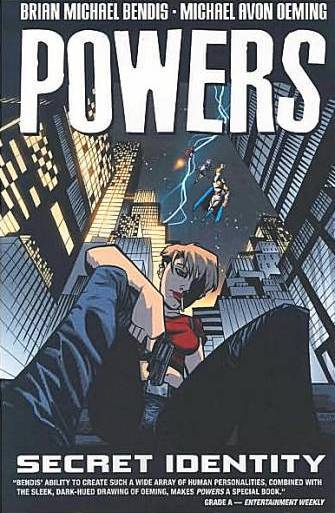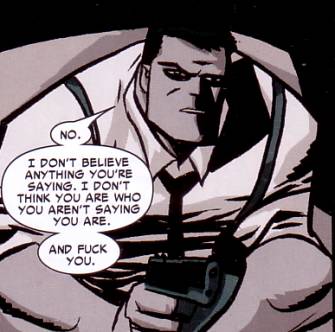 Home > CR Reviews
Home > CR Reviews Powers Volume Eleven: Secret Identity
posted July 20, 2010
Powers Volume Eleven: Secret Identity
posted July 20, 2010

 Creators:
Creators: Brian Michael Bendis, Michael Avon Oeming
Publishing Information:Marvel, softcover, 200 pages, January 2008, $19.95
Ordering Numbers: 9780785122616 (ISBN13), 0785122613 (ISBN10)
My
Powers reading has always been sporadic. What individual issues I've read cluster towards the series' beginnings with Image rather than the work that's been done more recently for Marvel/Icon.
Powers is a police drama set in the world of superheroes, that presents its fantasy elements through a double prism of previous superhero comics and modern celebrity culture. Its matter-of-fact take on superhero comics as a mode of presentation that most adults have no trouble devouring have helped make it one of the more influential titles of the last decade. Brian Bendis' writing has become an industry standard if only because he's writing many of the tentpole series at Marvel now. I actually had a hard time cracking its Mamet-style rhythms here, lighter than you'd expect if you've read some of the recent superhero comics that take fractured dialogue of the Joe Mantegna kind to an almost comedic extreme, but still difficult enough to dig into that the first few dozen pages needed to be re-read after I became the text's willing partner. Michael Avon Oeming's art is like that, too, all stylish angles and idiosyncratic visual coding -- what's attractive, what's not, what's a hint of something else, what's something as actually depicted. It took a while to settle in.

I think the strength of the series remains its mostly no-bullshit approach to how narratives unfold, which takes the form of a measured perspective on how its characters process the horrible things happening all around them. There's very little in the way of histrionics in the way the young super-team at the center of the multiple-murder plots in this volume self-destructs so spectacularly, so painfully. In fact, Bendis neatly undercuts the drama of what's being depicted with a page or two of people processing the horrific events through outcomes like the resulting boost in value to collectible toys. At the heart of the murder mystery is a secondary identity held by one of the major players and the series of rapid judgments and misapprehensions that this devilish persona triggers. As will come as no surprise to anyone who's ever read anything more complicated than a grocery list, the identity games in the narrative's foreground finds resonance in the identity issues and resulting questions through which the leads Christian Walker and Deena Pilgrim stumble in a believably sloppy way. As a latecomer, I think I missed a great deal of the resonance in certain scenes between that pair that might have struck longtime readers more squarely and with greater impact. Further, I think how we process one or two scenes about their relationship might have been key in terms of finding a balance between the two major narratives overall. Lacking that perspective, I thought the seams showed a bit.
Don't get me wrong. This is a sturdy, entertaining comic book, and it's perhaps most likely to be enjoyed by people who embrace the range of source material involved without questioning any of them too deeply, I don't see anything wrong with that. If I had a major complaint, it seemed to me that there was a hint of thematic dissonance in the air. For the first time in my admittedly limited memory of reading this series, I wasn't right-away sure how to process the fantasy elements of the kind that naturally arise from superhero comics in terms of the more quotidian police drama elements. Is there something being said there about the way cops begin to resemble the people they police? The way that all relationships can develop out-sized elements that can't be negotiated by simply orienting yourself towards them? I'm not certain, and I remain unsure that one doesn't overwhelm the other in a way that scatters one's bearings.



